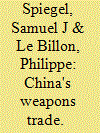| Srl | Item |
| 1 |
ID:
086951


|
|
|
|
|
| Publication |
2009.
|
| Summary/Abstract |
China is among the largest exporters of arms to the developing world and is often criticized for exacerbating violent conflicts in Africa. This article examines geopolitical tensions surrounding some of China's most controversial weapons alliances, rethinking the role of the global media, state leaders and non-state actors in forming fragmentary movements of 'resistance'. Focusing on the tensions around a shipment of Chinese arms to Zimbabwe during a period of mid-election repression and violence in 2008, this article is a media content analysis on the debates about diplomacy, arms embargoes, regime violence, protests against the Beijing Olympics, and efforts by China to counter western critics. The article argues that more rigorous diplomatic efforts to block the weapons were required and that the moral and political hazards of unreflexive foreign policy analysis emboldened the Chinese authorities' denial of their responsibilities. Beyond the case of Zimbabwe, we suggest that a deeper and wider understanding of 'geopolitical resistance' against violence is vital.
|
|
|
|
|
|
|
|
|
|
|
|
|
|
|
|
| 2 |
ID:
141067


|
|
|
|
|
| Summary/Abstract |
Although conflict in Zimbabwe's diamond mining sector has recently received much international scrutiny, very little research has examined conflict in Zimbabwe's gold mining sector. This article analyses how a nationwide crackdown called Operation Chikorokoza Chapera (‘No More Illegal Mining’) affected – and ‘disciplined’ – livelihoods in profound ways in both licensed and unlicensed gold mining regions. Drawing on interviews conducted between 2006 and 2013 with artisanal miners in the Insiza, Umzingwani and Kadoma areas as well as miners who crossed the border to Mozambique, the study reveals how a highly politicised crackdown led to uneven consequences. The analysis highlights both structural and physical violence, with more than 25,000 miners and traders arrested between 2006 and 2009 and more than 9,000 still imprisoned in 2013. Situating the crackdown within evolving political and economic interests, the study contributes to an understanding of how simplified discourses on ‘eradicating illegal mining’ mislead and mask power dynamics, while policing activities transform patterns of resource control. The study also emphasises that conceptualisations of the crackdown's legacy should carefully consider the agency of artisanal miners' associations, which, in some cases, have been actively seeking to resist coercive policies and rebuild livelihoods in the aftermath of Operation Chikorokoza Chapera.
|
|
|
|
|
|
|
|
|
|
|
|
|
|
|
|